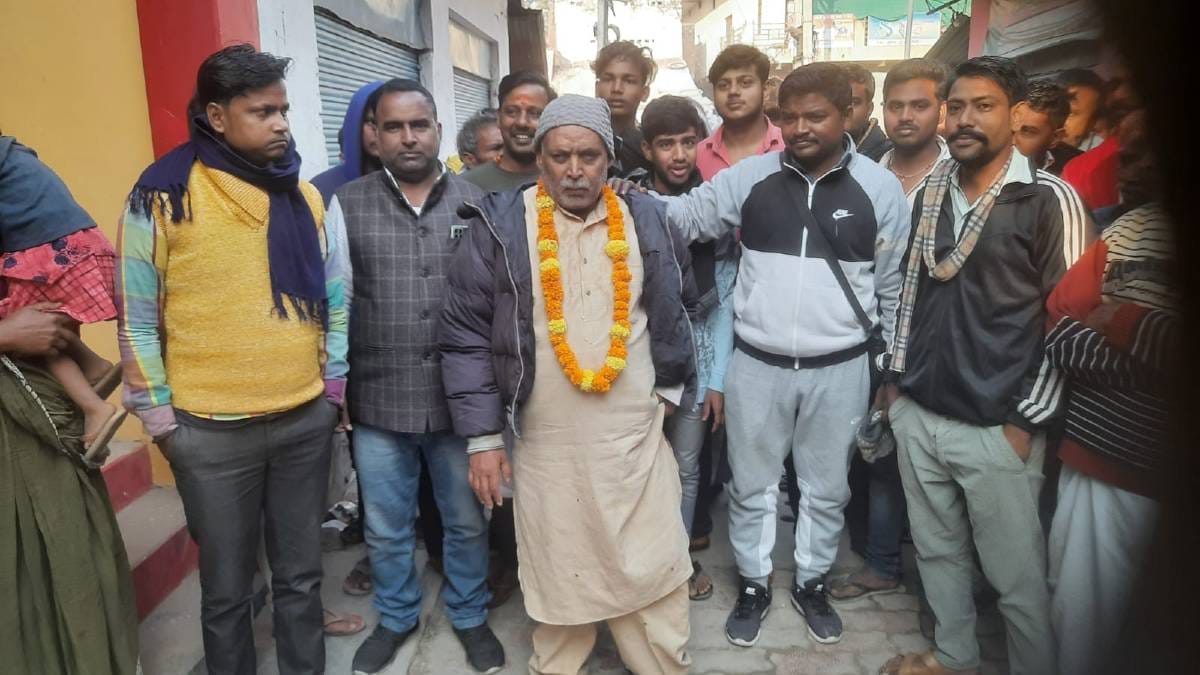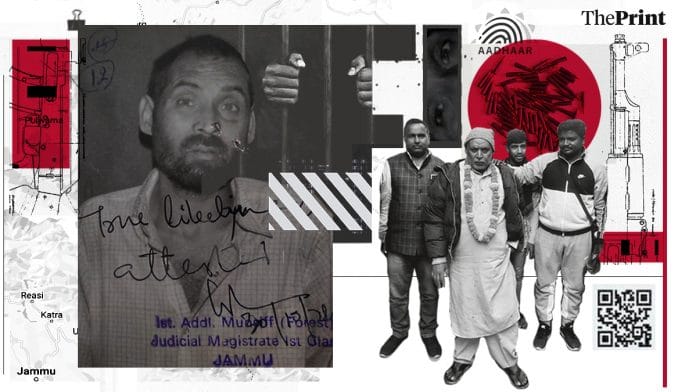New Delhi: When 47-year-old Jai Parkash returned to his village Kamalpur in Uttar Pradesh this Wednesday, everything had changed. His father was paralysed and his mother, brother, and sister had passed away. He could no longer even speak his mother tongue Bhojpuri fluently. The last time Parkash had been home was over two decades ago, when he had set out in search of work to help his impoverished family.
Then, as far as his relatives knew, he dropped off the face of the earth. What they didn’t know was that he had somehow made his way to Jammu in October 2000, where he was arrested for allegedly possessing ammunitions without a license. The offences in question were bailable, but Parkash ended up in jail for the next 22 years.
Deemed to be of “unsound mind”, he never went to trial and there was no one to furnish the Rs 30,000 surety bond. For most of his detention, the authorities did not even know his name, leading his case to be given a rather unusual name for a while: “State vs Person whose photograph has been placed on the file, his name is not known”.
Then, there was a stroke of ‘luck’ this August. Jai Parkash was featured on the list of undertrials that were granted special remission as part of the government’s ‘Azadi ka Amrit Mahotsav’ to mark 75 years of India’s independence.
This is when his cousin, Sudama Parshad, was intimated about Parkash’s presence in Jammu’s Amphalla district. Parshad then produced the surety amount and Jai Parkash was finally released on bail this Monday, reaching his village two days later.
Meanwhile, in September, Parkash filed a writ petition through his advocate Irfan Khan, in the Jammu & Kashmir and Ladakh High Court seeking compensation of Rs 50 lakh for “illegal detention without justification”. The petition stated that the case against him was “false and frivolous”.
Here’s a look at Parkash’s harrowing ordeal and why it took so long for his family to learn of his whereabouts even after he had been identified.
Also Read: ‘Mini trial by HC, Maoist links’: Why NIA wants Bhima Koregaon accused Teltumbde to stay in jail
‘Filed a missing persons report’
Jai Prakash had been a good student as a child and could read and write in English, his cousin Sudama Parshad told ThePrint.
“He left home because of his family’s bad financial situation. His family is one of the poorest in our village,” he said.
However, the Government Railway Police (GRP), Jammu arrested Parkash in October 2000 for allegedly violating sections 3 and 25 of the Arms Act, which lay down provisions for licences for acquiring firearms and ammunition, and punishment, both bailable offences.
According to the petition, the police claimed that they recovered 34 live AK-47 bullets from him at the time of his arrest.

Parshad seemed baffled by this allegation. According to him, it seemed odd that Parkash was involved with arms since he was easily scared, “even by a three-year-old child”.
Meanwhile, a January 2001 order by the city court noted that no one appeared on the behalf of the accused for submission of bail petition. This was also the order that led to the curious naming of his case.
He was found to be of “unsound mind” by the head of department (HOD), psychiatry, Government College of Jammu, in a report submitted in the city court in 2001.
But Parkash had not been forgotten back home. The writ petition mentions a missing persons report registered by Parkash’s family at the local police station before his case started.
“The missing person report did not materialise into anything. So many people leave the village and don’t come back, we just thought he was one like that,” Parshad said.
‘Name and address were known by 2014’
Speaking to ThePrint, advocate Irfan Khan said that even if convicted, Parkash would have been sentenced to a minimum of three years. “But he remained without trial during these years,” Khan said.
The petition alleged that his “illegal detention” was a “violation of the fundamental right guaranteed under Article 21 [Right to life and personal liberty]”.
It added, “he [is] now almost insane and living in a worse condition because of the negligence… during the period of illegal detention, he lost his mother and real brother and his old father is waiting for him”. Parkash’s cousin told ThePrint that he also lost his sister.
“It should be questioned why this exercise [of releasing him on bail] was not conducted when the jail authorities created his Aadhaar card in 2014 in which he had given his name [Jai Parkash] and address [Kamalpur, Banaras], along with the name of his father [Murli],” asked Khan.

The writ petition noted that in 2014 the Amphalla district jail superintendent (SP) initiated the process of making Aadhar cards. At that time, Parkash categorically stated his correct name, as well as his father’s along with his village, tehsil, post office, and district details, and the same card was sent by the Aadhaar department to the postal address given by him, the petition further added.
Parshad said that his family received the Aadhar card but there was no indication that he was in jail. “Why was the family not informed that he is in jail when the card was sent to his address,” he asked.
“[It was] the duty of respondent number four [Amphalla district jail SP] to, at least, convey the message to respondents number two and three [Senior Superintendent, Railway Police & Station House Officer, GRP, Jammu] for verification of the address but nothing was done,” the petition submitted.
Also Read: ‘Got diplomas, won awards’: What SC said as it freed 6 convicted in Rajiv Gandhi assassination
‘Very sorry state of affairs’
The writ petition seeks to quash criminal charges against Parkash while also asking the Civil Secretariat of the union territory of Jammu and Kashmir to initiate a departmental inquiry against the police and the jail authorities.
The single bench judge Sanjay Dhar, in the interim order dated 19 September, said, ‘“The allegations made in the writ petition, if taken at their face value present a very sorry state of affairs prevailing in the magistracy, police, and jail authorities.”
According to the writ petition, Parkash was arrested while the police were on patrolling duty and saw him roaming without shoes with a polythene bag in his pants.
The petition further noted that after investigation, the police submitted the charge sheet before the Court of JMIC (City Judge) remarking that he “seems to be a lunatic”.
The earlier mentioned 2001 court order found him to be of “unsound mind” as also claimed in the charge sheet and sent him to judicial lockup and directed the police to get him medically examined by chief medical officer (CMO), Jammu.
According to a May 2001 order, based on the psychiatric evaluation of Parkash, the city judge noted that the man was suffering from chronic mental illness and directed the superintendent of police, district jail, Jammu to get him admitted for treatment. The judge also asked for the recovery report to be submitted before the court.
On this, the HC noted: “The file seems to have been consigned to records by the learned magistrate without passing any further orders in the matter and without holding any inquiry in the matter.”
Khan explained that the term “consigned to records”, means that the case was “temporarily closed”.
The HC issued a notice to the state asking them to file a response. The hearing is scheduled for 31 January 2023.
The writ petition also brings notice to the alleged negligence on the part of respondent number four (SP, Amphalla district jail). “[He was] just provided food and shelter, playing with fundamental rights (sic),” it said.
Modi’s call to release undertrial prisoners
Two-thirds of the inmates in prisons across the country are classified as undertrials. As part of ‘Azadi ka Amrit Mahotsav’, Prime Minister Modi had called for their speedy release as they had been languishing in jail for years without legal aid.
According to the writ petition, Parshad, came to know about Parkash being locked up in Jammu from UP’s Dheena police station. The Jammu police contacted the police station because he featured on the list of undertrials that were granted special remission.
Parshad said he then went to Jammu and visited him in Amphalla jail. Parkash was “excited” to see him, he said. “He exclaimed in Punjabi, ‘my brother has come’ and hugged me.”
After Parshad furnished the bond, the City Judge/Judicial Magistrate First Class (JMIC) Monday directed the in-charge of Amphalla district jail to release Jai Parkash, ordered for his treatment at a psychiatric hospital, and asked him to be produced before the court as and when he is capable of standing trial. This happened parallelly to the writ petition.
As for Parkash, settling back into life as he knew it 22 years ago will not be possible even though he received a walm welcome at the village, complete with garlands and new clothes from villagers. He has lost his command over Bhojpuri but is trying to speak it, his cousin said.
(Edited by Theres Sudeep)
Also Read: ‘No fair trial’ — what SC said while acquitting 3 convicted in 2012 Chhawla gangrape & murder






